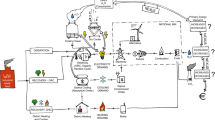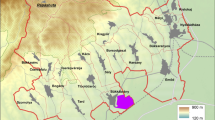Abstract
Transformation of the heating sector is recognized as being essential for ensuring reliable and affordable energy services provided with reduced consumption of energy sources and diminished impact on the environment and less import dependency. The possibility of utilizing energy sources that otherwise would be wasted needs to be considered and treated as a big advantage of district heating systems. Despite many advantages, sewage wastewater heat is still a mostly unused resource at the global level and a totally unused energy source in Serbia, while data about the potential of this energy source are lacking. This research proposes a methodology for the determination of the technical potential of waste heat from wastewater treatment facilities for use in district heating systems by heat pump application. Data from existing wastewater treatment facilities are used for providing data for replication in cities without wastewater treatment plants but with district heating systems. An estimation of the recoverable heat energy potential of wastewater is used for evaluation of some effects that could be obtained through its full utilization for heat production in the existing district heating systems. Three groups of indicators are selected for analysis focusing on district heating systems' energy performance (primary energy factor, specific heat consumption per degree day and heating area), the security of energy supply (import dependency, Shannon–Wiener diversification index, the share of renewables) and environmental impact (carbon dioxide emission coefficient). Values of the selected indicators are determined for the current state of district heating systems and for the possible future state that could be achieved after full utilization of sewage wastewater potential. The proposed methodology is applied to Serbia, as a case study. It has been shown that all analyzed indicators for the projected future would have more preferable values compared to the values that correspond to the current state of the district heating systems. The use of this renewable energy source should provide primary energy savings of 5% per year, reduction of carbon dioxide emission of 6.5% per year, reduction of import dependency of DH systems of 9.8% and improved diversification of energy sources of 21%.
Graphic Abstract







Similar content being viewed by others
Abbreviations
- DH:
-
District heating
- GHG:
-
Greenhouse gases
- HP:
-
Heat pump
- \(f_{{\text{p}}}\) :
-
Primary energy factor
- \(E_{i}\) :
-
Energy content of input to the system of the ith energy carrier
- \(f_{{{\text{p}},i}}\) :
-
Primary energy factor of the ith energy carrier
- \(Q_{{{\text{ext}}}}\) :
-
Externally supplied heat
- \(f_{{{\text{p}},{\text{ext}}}}\) :
-
Primary energy factor of the external heat supply
- \(E_{{{\text{el,aux}} }}\) :
-
Auxiliary electricity
- \(f_{{\text{p,el}}}\) :
-
Primary energy factor for electricity production
- \(Q_{{{\text{del}},j}}\) :
-
Delivered heat to the jth consumer
- q DD :
-
Useful annual heat supplied per degree day and heating area
- DD:
-
Number of degree days
- \(Ai\) :
-
Heating area of the ith consumer
- Id :
-
Import dependency
- p i :
-
Fraction of the ith input energy carrier/fuel in the fuel mix (\(\sum p_{i} = 1\))
- \(I_{{{\text{d}},i}}\) :
-
Import dependency of the ith energy carrier/fuel
- H :
-
Shannon–Wiener index
- F RES :
-
Share of renewable energy sources
- \(E_{{i,{\text{RES}}}}\) :
-
Energy content of input to the system of the ith renewable energy carrier
- \(Q_{{\text{ext,RES}}}\) :
-
Externally supplied heat produced from renewables
- K p,dh :
-
Carbon dioxide emission coefficient
- \(E_{i}\) :
-
Energy content of input to the system of the ith energy carrier
- \(K_{pi}\) :
-
Primary CO2 emission coefficient of the ith energy carrier
- \(K_{{{\text{ext}}}}\) :
-
Primary CO2 emission coefficient of externally supplied heat
- \(K_{{{\text{el}}}}\) :
-
Carbon dioxide emission coefficient of electricity
- \(\dot{Q}_{{\text{w}}}\) :
-
Recoverable heat power-treated sewage wastewater
- \(\dot{m}\) :
-
Mass flow of treated wastewater
- \(t\) :
-
Temperature difference of treated wastewater at entrance and exit of heat exchanger–evaporator
- \(\dot{Q}_{{\text{h}}}\) :
-
Thermal power of heat pumps
- COP:
-
Coefficient of performance
- \(t_{{{\text{lift}}}}\) :
-
Temperature deference between treated wastewater and supply water
- \(Q_{{{\text{HP}}}}\) :
-
Heat energy produced by heat pumps
- \(q_{{{\text{HP}}}}\) :
-
Availability of heat energy
- n :
-
Number of inhabitants
- \(q_{{{\text{PE}}}}\) :
-
Primary energy savings in ith DH system
- PE:
-
Population equivalent
- η :
-
Represents the efficiency of heat production in the existing DH system
References
Alekseiko LN, Slesarenko VV, Yudakov AA (2014) Combination of wastewater treatment plants and heat pumps. Pac Sci Rev 16(1):36–39. https://doi.org/10.1016/j.pscr.2014.08.007
Association of Serbian district heating companies-Tops (2018) Data overview for 2017. https://www.toplanesrbije.org.rs/sr/publikacije. Accessed 2 Aug 2019 (In Serbian)
Averfalk H, Ingvarsson P, Persson U, Gong M, Werner S (2017) Large heat pumps in Swedish district heating systems. Renew Sustain Energ Rev 79:1275–1284. https://doi.org/10.1016/j.rser.2017.05.135
David A, Mathiesen BV, Averfalk H, Werner S, Lund H (2017) Heat roadmap Europe: large-scale electric heat pumps in district heating systems. Energies 10(4):578. https://doi.org/10.3390/en10040578
Duić N (2015) Is the success of clean energy guaranteed? Clean Technol Environ Policy 17:2093–2100. https://doi.org/10.1007/s10098-015-0969-y
Ðurđevic D, Balic D, Frankovic B (2019) Wastewater heat utilization through heat pumps: the case study of city of Rijeka. J Clean Prod 231:207–213. https://doi.org/10.1016/j.jclepro.2019.05.235
Ecoheat4cities (2016) Guidelines for technical assessment of district heating systems. www.euroheat.org/wp-content/uploads/2016/04/Ecoheat4cities_3.1_Labelling_Guidelines.pdf. Accessed 2 Aug2019
Econoler (2012) National building energy efficiency study for Serbia. World Bank
European Commission (2016) An EU strategy on heating and cooling, COM 51 final. https://ec.europa.eu/energy/sites/ener/files/documents/1_EN_ACT_part1_v14.pdf. Accessed 2 Aug 2019
European Heat Pump Association (2017) Large scale heat pumps in Europe. Industrial & Commercial Heat Pump Working Group (ICHP). https://www.ehpa.org/fileadmin/red/03._Media/03.02_Studies_and_reports/Large_heat_pumps_in_Europe_MDN_II_final4_small.pdf. Accessed 3 Aug 2019
Fiore S, Genon G (2014) Heat recovery from municipal wastewater: evaluation and proposals. Environ Eng Manag J 13(7):1595–1604. https://doi.org/10.30638/eemj.2014.177
Hepbasli A, Biyik E, Ekren O, Gunerhan H, Araz M (2014) A key review of wastewater source heat pump (WWSHP) systems. Energy Convers Manag 88:700–722. https://doi.org/10.1016/j.enconman.2014.08.065
Intelligent energy Europe (2017) Heating with wastewater heat Best practice Catalogue. https://www.grazer-ea.at/cms/upload/wastewaterheat/bp_catalogue_070321.pdf. Accessed 2 Aug 2019
International Energy Agency (2014) Heating without global warming—Market developments and policy considerations for renewable heat. https://www.iea.org/publications/freepublications/publication/FeaturedInsight_HeatingWithoutGlobalWarming_FINAL.pdf. Accessed 2 Aug 2019
International Energy Agency (2016) Energy technology perspectives 2016. Towards Sustainable Urban Energy Systems, IEA, Paris
Jesper M, Schlosser F, Pag F, Walmsley TG, Schmitt B, Vajen K (2021) Large-scale heat pumps: uptake and performance modelling of market-available devices. Renew Sustain Energy Rev 137:110646. https://doi.org/10.1016/j.rser.2020.110646
Kollmann R, Neugebauer G, Kretschmer F, Truger B, Kindermann H, Stoeglehner G, Ertl T, Narodoslawsky M (2017) Renewable energy from wastewater—practical aspects of integrating a wastewater treatment plant into local energy supply concepts. J Clean Prod 155(1):119–129. https://doi.org/10.1016/j.jclepro.2016.08.168
Kontu K, Rinne S, Junnila S (2019) Introducing modern heat pumps to existing district heating systems—global lessons from viable decarbonizing of district heating in Finland. Energy 166:862–870. https://doi.org/10.1016/j.energy.2018.10.077
Lo L-H (2011) Diversity, security, and adaptability in energy systems: a comparative analysis of four countries in Asia. World Renew Energy Congr Swed 2011:2401–2408. https://doi.org/10.3384/ecp110572401
Lu C, Wang S, Wang K, Gao Y, Zhang R (2020) Uncovering the benefits of integrating industrial symbiosis and urban symbiosis targeting a resource-dependent city: a case study of Yongcheng. China J Clean Prod 255:120210. https://doi.org/10.1016/j.jclepro.2020.120210
Maddah S, Deymi-Dashtebayaz M, Maddah O (2020) 4E analysis of thermal recovery potential of industrial wastewater in heat pumps: an invisible energy resource from the Iranian casting industry sector. J Clean Prod 265:121824. https://doi.org/10.1016/j.jclepro.2020.121824
Madžarević A, Ivezić D, Živković M, Tanasijević M, Ivić M (2018) Assessment of vulnerability of natural gas supply in Serbia: State and perspective. Energy Policy 121:415–425. https://doi.org/10.1016/j.enpol.2018.06.037
Market uptake of small modular renewable district heating and cooling grids for communities Project No: 691679 (2018) Heating/cooling demand and technical concept for district heating/cooling in Šabac. https://www.coolheating.eu/images/downloads/concepts/Report-D4.4-technical-concept-Sabac-Letnjikovac.pdf. Accessed 3 Aug 2019
Mateu-Royo C, Sawalha S, Mota-Babiloni A, Navarro-Esbrí J (2020) High temperature heat pump integration into district heating network. Energy Conver Manag 210:112719. https://doi.org/10.1016/j.enconman.2020.112719
Mazhar AR, Liu S, Shukla A (2018) A state of art review on the district heating systems. Renew Sustain Energy Rev 96:420–439. https://doi.org/10.1016/j.rser.2018.08.005
Meggers F, Leibundgut H (2011) The potential of wastewater heat and exergy: decentralized high-temperature recovery with a heat pump. Energy Build 43(4):879–886. https://doi.org/10.1016/j.enbuild.2010.12.008
Meunier F (2004) Sorption contribution to climate change control. Clean Technol Environ Policy 6:187–195. https://doi.org/10.1007/s10098-003-0226-7
Ministry of environmental protection (2018) Report on environmental issues for 2017. http://www.sepa.gov.rs/download/Izvestaj_2017.pdf. Accessed 3 Aug 2019
Ministry of environmental protection (2019) CEBs support to projects related to environmental protection. https://www.ekologija.gov.rs/podrska-ceb-a-projektima-zastite-zivotne-sredine-u-srbiji/?lang=lat. Accessed 3 Aug 2019
Ministry of Mining and Energy (2015) Energy sector development strategy of the Republic of Serbia for the period by 2025 with projections by 2030. http://www.mre.gov.rs/doc/efikasnost-izvori/23.06.02016%20ENERGY%20SECTOR%20DEVELOPMENT%20STRATEGY%20OF%20THE%20REPUBLIC%20OF%20SERBIA.pdf. Accessed 2 Aug 2019
Neugebauer G, Kretschmer F, Kollmann R, Narodoslawsky M, Ertl T, Stoeglehner G (2015) Mapping thermal energy resource potentials from wastewater treatment plants. Sustainability 7:12988–13010. https://doi.org/10.3390/su71012988
PU Beogradskeelektrane (2018) Business report for 2017. http://www.beoelektrane.rs/wp-content/uploads/2018/07/7.1-Izve%c5%a1taj-o-poslovanju-za-2017.godinu-Prvi-deo.pdf. Accessed 2 Aug 2019 (In Serbian)
Santin M, Chinese D, De Angelis A, Biberacher M (2020) Feasibility limits of using low-grade industrial waste heat in symbiotic district heating and cooling networks. Clean Technol Environ Policy 22:1339–1357. https://doi.org/10.1007/s10098-020-01875-2
Sarpong G, GnaneswarGude V, Magbanua B, Truax DD (2020) Evaluation of energy recovery potential in wastewater treatment based on codigestion and combined heat and power schemes. Energy Convers Manag 222:113147. https://doi.org/10.1016/j.enconman.2020.113147
Sayegh MA, Jadwiszczak P, Axcell BP, Niemierka E, Brys K, Jouhara H (2018) Heat pump placement, connection and operational modes in European district heating. Energy Build 166:122–144. https://doi.org/10.1016/j.enbuild.2018.02.006
Somogyi V, Sebestyén V, Domokos E (2018) Assessment of wastewater heat potential for district heating in Hungary. Energy 163:712–721. https://doi.org/10.1016/j.energy.2018.07.157
Spriet J, McNabola A, Neugebauer G, Stoeglehner G, Ertl T, Kretschmer F (2020) Spatial and temporal considerations in the performance of wastewater heat recovery systems. J Clean Prod 247:119583. https://doi.org/10.1016/j.jclepro.2019.119583
Standard EN 15316-4-5 (2017) Energy performance of buildings—Method for calculation of system energy requirements and system efficiencies—Part 4–5. District heating and cooling
Statistical Office of the Republic of Serbia (2013) Installations and auxiliary premises in dwellings. http://publikacije.stat.gov.rs/G2013/Pdf/G20134008.pdf. Accessed 2 Aug 2019
Statistical Office of the Republic of Serbia (2017) Total energy balance in 2017. http://publikacije.stat.gov.rs/G2018/Pdf/G20185632.pdf. Accessed 2 Augt 2019
Stojiljkovic M, Todorovic M (2015) Basics of building energy balancing. Serbian Chamber of Engineers. http://www.ingkomora.org.rs/strucniispiti/?stranica=materijalEE. Accessed 2 Aug 2019 (In Serbian)
United Nations (2019) Sustainable development goals. https://www.un.org/sustainabledevelopment/sustainable-development-goals/. Accessed 2 Aug 2019
Acknowledgements
This research was supported by the Ministry of Environmental Protection of the Republic of Serbia, Green fund, contract number 401-00-1207/2018-05.
Funding
This research was supported by the Ministry of Environmental Protection of the Republic of Serbia, Green fund, contract number 401-00-1207/2018-05.
Author information
Authors and Affiliations
Contributions
Marija Živković was involved in conceptualization, methodology, investigation, writing—original draft, writing—review & editing. Dejan Ivezić performed conceptualization, formal analysis, supervision, writing—review & editing.
Corresponding author
Ethics declarations
Conflicts of interest
The authors declare that they have no known competing financial interests or personal relationships that could have appeared to influence the work reported in this paper.
Additional information
Publisher's Note
Springer Nature remains neutral with regard to jurisdictional claims in published maps and institutional affiliations.
Rights and permissions
About this article
Cite this article
Živković, M., Ivezić, D. Utilizing sewage wastewater heat in district heating systems in Serbia: effects on sustainability. Clean Techn Environ Policy 24, 579–593 (2022). https://doi.org/10.1007/s10098-021-02063-6
Received:
Accepted:
Published:
Issue Date:
DOI: https://doi.org/10.1007/s10098-021-02063-6




